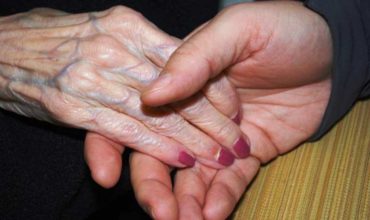More than 45 million people across the country currently provide an estimated $306 billion in “free” caregiving services for a chronically ill, disabled or aged spouse, family member or friend during any given year. That is almost twice as much as is actually spent on homecare and nursing home services combined ($158 billion). According to the Family Caregiving Alliance, there is a much higher likelihood of receiving care from a spouse than from an adult child. In fact, nearly one-quarter of caregivers who are currently caring for a spouse are themselves over the age of 65.
Caregivers are often so busy caring for others that they tend to neglect their own emotional, physical, and spiritual health. The demands on a caregiver’s body, mind, and emotions can easily seem overwhelming, leading to fatigue and hopelessness — and, ultimately, burnout. Spousal caregivers are especially prone to “burnout” because the significant changes in the marital relationship can often leave the spouse who is giving the care feeling overwhelmed and stressed. This anxiety can be compounded if the caregiver is also taking over responsibilities that were once handled solely by their ailing spouse, from cooking and doing laundry, to balancing the checkbook and heading up the financial decisions.
In addition, there is very often a considerable sense of loss when one is involved in caring for their spouse. This is especially prevalent if ones spouse suffers from significant cognitive decline or if activities that once provided pleasure and deepened a sense of connection are no longer possible. Caregiving spouses often begin to feel very isolated from friends and feel tremendous guilt about their own unmet needs. Subsequently, they take on this “labor of love” and let their own positive health habits drop off to the side, putting their health at risk.
In fact, the Journal of American Medical Association reports that if one is a spousal caregiver between the ages of 66 and 96, and is experiencing ongoing mental or emotional strain as a result of their caregiving duties, there is a 63% increased risk of dying over those people in the same age group who are not caring for a spouse. The combination of loss, prolonged stress, the physical demands of caregiving and the health vulnerabilities that simply come with age place an older spousal caregiver in a danger zone.
Spousal caregivers especially need to know and recognize the symptoms of burnout and how best to cope. It is a state of physical, emotional, and mental exhaustion that may be accompanied by a change in attitude — from positive and caring to negative and unconcerned. Burnout can occur when spousal caregivers don’t get the help they need or if they try to do more than they are able — either physically or financially. Here are some tips to help identify, and address, spousal caregiver burnout.
Q: What are some of the signs that a spousal caregiver is experiencing burnout?
- Missing or delaying their own doctor appointments
- Ignoring their own health problems or symptoms
- Not eating a healthy diet for lack of time
- Overusing tobacco and alcohol when they feel stressed
- Giving up exercise habits for lack of time
- Losing sleep
- Losing connections with friends or lack of time to socialize
- Bottling up feelings of anger and frustration and then being surprised by angry, even violent, outbursts directed at your spouse, other family members, co-workers – even strangers
- Feeling sad, down, depressed or hopeless
- Loss of energy
- Lacking interest in things that used to give them (and their spouse) pleasure
- Feeling resentful toward their spouse
- Blaming their spouse for the situation
- Feeling that people ask more of them than they should
- Feeling like caregiving has affected family relationships in a negative way
- Feeling annoyed by other family members who don’t help out or who criticize their level of care
Q: What are some of the long-term effects of spousal caregiver burn out?
The stress of spousal caregiving for persons caring for someone with dementia has been shown to negatively impact a person’s immune system for up to three years after their caregiving ends – thus increasing their chances of developing a chronic illness themselves. Also, spousal caregivers experiencing extreme stress have been shown to age prematurely. This level of stress can take as much as 10 years off a spousal caregiver’s life.
Q: What is the best way to prevent spousal burnout?
Here are ten great tips that were provided by the Family Caregivers Association….
- Caregiving is a job and respite is your earned right. Reward yourself with respite breaks often.
- Watch out for signs of depression and don’t delay in getting professional help when you need it.
- When people offer to help, accept the offer and suggest specific things that they can do to help.
- Educate yourself about your loved one’s condition and how to communicate effectively with doctors.
- There’s a difference between caring and doing. Be open to technologies and ideas that promote your loved one’s independence.
- Trust your instincts. Most of the time they’ll lead you in the right direction.
- Spousal caregivers often do a lot of lifting, pushing, and pulling. Be good to your back.
- Grieve for your loss and then allow yourself to dream new dreams.
- Seek support from other spousal caregivers. There is great strength in knowing you are not alone.
- Stand up for your rights as a caregiver and a citizen.
Q: Why do some spousal caregivers have a hard time asking for help?
Because they feel that asking for help is a sign they aren’t handling the situation well. But the truth is…your spouse/partner will be in better hands if you, yourself have some help. It is important to have people to support you, while taking care of someone else.
Q: What are some preparations that a spousal caregiver can make to help ease the pressure?
Get papers and affairs out of the way: This seems to be a common-sense type of thing but it is one that is often put off until it is too late. If the spouse has Alzheimer’s disease and can no longer sign for him/herself matters are dramatically more complex. It is important not to just get a will made and signed, but to take care of all the other paper work. Mortgages and all debts should be caught up. You should consult with an experienced elder care lawyer about the disposition of assets while your spouse is still considered legally competent. Make sure that you have other legal documents such as durable Powers of Attorney filled out for both you and your spouse. Without a durable POA you may have to go get a guardianship later in order to speak for your spouse and protect your spouse’s rights.
Q: What are some of the more positive aspects of being a spousal caregiver?
While caregiving can be a very stressful situation for many spousal caregivers, studies also show that there are beneficial effects, including feeling positive about being able to help a disabled spouse, feeling appreciated by the care recipient, and feeling that their relationship with the care recipient has improved.
Sources:
The Family Caregiver – www.thefamilycaregiver.org – 1-800-896-3650
Revolution Health – www.revolutionhealth.com
Caregiver Stress Organization – www.caregiverstress.com – 888-484-5759
Family Caregiving Alliance – www.caregiver.org
Journal of American Medical Association – www.jama.ama-assn.org
Eldercare Online – www.ec-online.net






